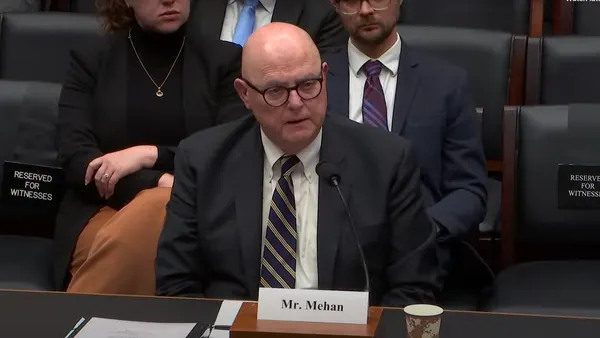2019 Earnings
| Revenue | $15.46B |
| YoY Change | 3.7%▲ |
| Net Income | $1.67B |
Q4 Earnings
| Revenue | $3.85B |
| Net Income | $447M |
Waste Management closed out 2019 with $4.28 billion in operating EBITDA – up 4% over 2018 – driven in part by ongoing strength in its collection and disposal business that more than offset recycling headwinds. Annual MSW landfill pricing was the company's best yet, with CEO Jim Fish touting during a company earnings call that he believes new levels are "really here to stay" after many years of volatility.
The industry giant projected further growth in 2020, with operating EBITDA as high as $4.66 billion and free cash flow possibly as high as $2.25 billion. That does not factor in a looming acquisition that would be the company's largest in decades.
All eyes on Advanced
- A $4.9 billion bid to acquire Advanced Disposal Services, announced in April 2019, is still pending antitrust approval from the U.S. Department of Justice (DOJ). COO John Morris reiterated past guidance that it is "on a trajectory we think to get clearance from DOJ right towards the end of the quarter."
- Executives anticipate DOJ could allow them to close the deal before completing required divestitures. That divestiture package has attracted "a really robust lineup of suitors" according to Morris, who likened it to "a line around the block of folks who are interested in these assets."
- Following approval, Morris now expects Waste Management could "achieve synergies in excess of the $100 million we laid out" and start seeing those gains in 2021 after an initial integration period.
Speculation has been swirling about the status of this deal in recent months, following a relatively tight-lipped discussion during the company's October Q3 call. As reported by Waste Dive in January, a divestiture package worth $200 million or more in annualized revenue has been circulating since late last year. Sources indicate it could ultimately include assets in states such as Wisconsin, Illinois, Pennsylvania, Georgia or possibly elsewhere.
Given overlap by large competitors in some of the relevant markets, many now expect there might have to be two buyers. One financial analyst asked about this in a broader question on Thursday's call, but executives did not address it. Morris said some of the expected divestitures are "in very high demand" given their quality, with Fish describing them as assets that "had it not been for this acquisition, would have never seen the light of day."
Beyond those required regulatory steps, Waste Management appears to be equally focused on a detailed integration plan to retain both employees and customers. The challenges of syncing up an acquisition of this scale are well-known, especially for Waste Management given its past experience.
During a December conference call with financial firm UBS, Fish described the task ahead as akin to integrating 10 smaller companies, given the industry's local nature. Citing multi-year issues in Kansas City, Kansas after the 2015 acquisition of Deffenbaugh Industries, Fish said the company had learned the importance of good local leadership and cautioned that "I don’t want to spend three years trying to integrate ADS."
Closing out 2019
- Fish described 2019 landfill pricing as one of the year's "bright spots" because it was increasing at a steadier rate to cover leachate costs, which he said are now going up "on a permanent basis." Yield is also beginning to improve for residential collection, which will be a continued focus – along with transfer stations – this year.
- 2019 recycling revenue was $1.04 billion, dragged down by a 35% decline in commodity prices that reduced revenue by $248 million as compared to 2018. But this only led to an estimated $2 million EBITDA hit, which Fish described as a sign the company's new pricing model is working.
- Waste Management spent $527 million on acquisitions during 2019 (including $9 million during Q4) on 18 businesses. Texas-based Petro Waste, an E&P landfill operator, accounted for much of that. The company also reported $51 million in divestiture proceeds.
Looking ahead
- For 2020, Waste Management anticipates core price to be 4% or higher and internal revenue growth from collection and disposal to be 2.5%. Following analyst questions, Fish recognized the latter number may be conservative given landfill pricing trends. Recycling commodity values are not expected to improve materially this year.
- Waste Management spent $248 million on stock buybacks in 2019, due to a slower pace after the Advanced acquisition announcement, but CFO Devina Rankin projected "at least $1 billion" going toward repurchases this year. The company returned $876 million in shareholder dividends in 2019, with rates now going up for the 17th consecutive year, to likely hit $920 million worth of dividends in 2020.
- Given the integration attention required for Advanced Disposal (pending DOJ approval) Waste Management only anticipates $100-200 million worth of tuck-in acquisitions this year. Still, Fish didn't rule out getting more engaged around Q4 if that integration process is going well and "something pops up on our radar that we just can't pass up."









